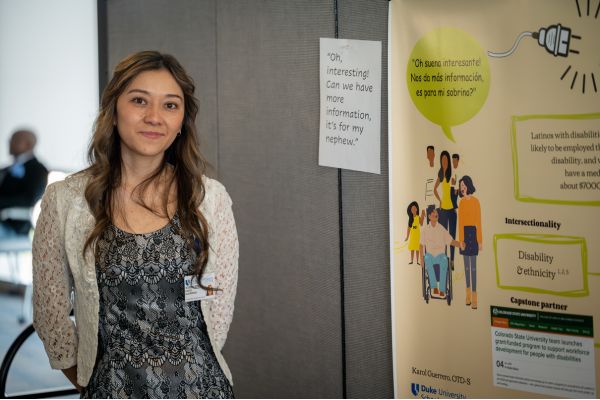From Colombia to Duke OTD and Beyond

After living in the U.S. for nearly a decade, I find myself reflecting on various experiences that have strengthened my Latina identity. Upon arrival, I struggled to connect with others due to unfamiliar contextual factors, including a new language, diverse cultures, and a completely different environment. Amid this uncertainty, I was fortunate to be embraced by a strong community that supported one another during challenging times and celebrated diversity based on life experiences, Spanish language use, socioeconomic backgrounds, and political realities from our countries of origin. The Hispanic/Latine community, which I considered a second family, provided invaluable assistance to my family and me, creating a sense of belonging in an unfamiliar country.
Years later, as I became more accustomed to life in the U.S., I developed a strong desire to help others, particularly Hispanic/Latine individuals facing significant barriers to accessing basic needs. This desire aligned with my cultural beliefs in collectivism, empathy, and the importance of helping others. With my background in occupational therapy (OT) from Colombia and a passion for service, I embarked on a journey of advocacy and community work, supporting individuals with intellectual and developmental disabilities alongside social workers. This experience was eye-opening in understanding the difficult reality of this population. It motivated me to serve my Latine community through a profession I was trained and passionate about—occupational therapy.
Becoming an occupational therapist in the U.S. presented another set of challenges as a Latina immigrant. While some institutions expressed enthusiasm for my OT background from Colombia, there was uncertainty regarding accepting someone with my background—an English learner educated in Colombia. I encountered doubts about my ability to succeed in rigorous OT programs, leading to rejection and discouragement. However, there was an institution that believed in my potential and empowered me to thrive, ultimately making my dream of becoming an OT once again a reality.
My Experience at Duke
The community at Duke University, where I was accepted and recently graduated with an Occupational Therapy Doctorate, facilitated my professional endeavors. Throughout the program, I was provided opportunities to deepen my understanding of the connection between occupation and health and to enhance my professional skills. For instance, I was encouraged and empowered to utilize my knowledge and experience as a Colombian-trained OT practitioner and assist other OT students in the program. Additionally, I received support to develop and implement a capstone project to increase awareness of and access to a new inclusive education program for Hispanic/Latine individuals with disabilities at Colorado State University.

What I'm Doing Now
My cultural inheritance of resilience and collectivism instills in me a strong sense of identity wherever I go. As a new Duke OTD graduate and Colorado resident, I embrace my Latinidad by engaging in initiatives supporting the Latine community. This includes being an active member of local Latine groups, helping to identify challenges and opportunities for individuals and families, empowering individuals with disabilities of Hispanic/Latine descent and their families through education about available resources, and exploring opportunities to educate others about the value of cultural representation in various contexts such as healthcare, education, and community.
This passion for supporting vulnerable populations continues to shape my professional journey. A commitment to service and a deep interest in mental health programs have recently led to a professional opportunity with the U.S. Department of Veterans Affairs. Through an interprofessional fellowship in Psychosocial Rehabilitation and Recovery-Oriented Services for veterans with serious mental illness and substance use disorders, I am gaining valuable experience applying psychosocial rehabilitation approaches, exploring opportunities to enhance veterans' participation in meaningful occupations within mental healthcare settings, and collaborating with research initiatives aimed at addressing disparities in healthcare access and promoting equitable services.